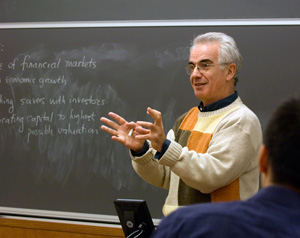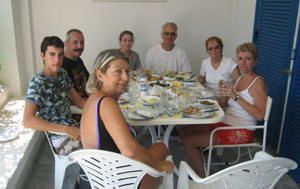Costas Azariadis, Ph.D., was a third-year engineering student in his native Athens, Greece, when he took his first class in economics. That was 40 years ago.
Today, the silver-haired professor of economics in Arts & Sciences and Edward Mallinckrodt Distinguished University Professor pauses at the memory of his college days. Then with a mischievous twinkle in his eyes and infectious smile, he says, “The course was incomprehensible!”

An ironic beginning for a man who has become “one of the world’s leading economists,” according to an article published in Macroeconomics Dynamics by Steven N. Durlauf, Ph.D. Durlauf writes, “(Azariadis’) research has profoundly influenced the way economists think about labor markets, business cycles and growth and development. No quick summary can ever capture the formal elegance or depth of his work.”
Azariadis didn’t set out to be an economist, but as he tells it with that twinkle again: “I fell in with a bad crowd.”
That “crowd” happened to be the economics department at Carnegie Mellon University, where two of the professors who mentored Azariadis and advised his doctoral thesis went on to earn Nobel Prizes in economics.
Ed Prescott, Ph.D., winner of the 2004 Nobel Prize, was one of those professors. He currently is a professor at Arizona State University.
“I remember meeting Costas many years ago,” Prescott says. “He talked like someone who had gone to Oxford or Cambridge and not like an engineer. He was as argumentative then as he is today, and it was a lot of work convincing him not to explore a line that had already been explored and had hit a dead end. Actually, it was Bob Lucas (1995 Nobel laureate) and me independently saying the same thing. I forget what that dead end was.”
Lucas, Ph.D., became Azariadis’ mentor in 1971. The young Greek engineer had come to get an M.B.A. but was lured into economics when he took an elective with Lucas, a young and rising star in the field. With a business degree in hand and two economics courses under his belt, Azariadis embarked on his doctorate and a journey into the academic world of economics that continues to this day.
Seeing the glass as half-full
Azariadis credits his wife of 44 years, Assimo, with the idea of pursuing a master’s degree in the United States.
“The biggest decisions of my life have been taken by my wife,” Azariadis says.
Assimo is a retired French teacher and recalls her motivation to leave Greece as a young married couple. “The reason why I favored the idea of coming to the U.S. is that I recognized my husband’s talents, the most important ones being creativity and optimism,” she says. “No matter how hard life has been for us, we never stopped seeing the glass as half-full, never half-empty.”
Pittsburgh and the campus of Carnegie Mellon were the first places they called home in America. Azariadis remembers that his business school classmates were a very international bunch and a challenge for the Athenian’s first exposure to English.
“The class was heavily foreign with students from Jamaica, England, Scotland, Texas and Boston — each with a different accent. Luckily, the instructor was from Ohio, and he was understandable!”
In addition to Greek and English, Azariadis speaks “tolerable French and bad Italian.” And of course the lingua franca of macroeconomics: mathematics.
“Economics became more mathematical in the ’60s, and people with math backgrounds thought it was a new and exciting field,” says Azariadis, who had focused on math and science to prepare for a career in engineering. His dissertation at Carnegie Mellon on implicit contract theory was a new and controversial application of microeconomic reasoning to macroeconomic problems in 1975. But, within a few years, it became part of the curriculum in almost every major graduate program in economics.
From Pittsburgh, Costas and Assimo Azariadis and their new baby daughter, Cleo, moved to Providence, R.I., for four years at Brown University and Costas’ first position as an assistant professor of economics. Next stop: Philadelphia, where the University of Pennsylvania was home for 15 years.
In 1992, the family moved to Los Angeles, where Azariadis served as the Distinguished Professor of Economics at the University of California, Los Angeles, for more than a decade before accepting his appointment at WUSTL in 2005.

Welcome to St. Louis
“Costas is one of several high-caliber macroeconomists whom we have hired recently,” says John Nachbar, Ph.D., professor and associate chair of the Department of Economics. “Our macroeconomics faculty is now one of the strongest in the world.”
Nachbar says that Azariadis has a very high citation count (the number of times a published paper is cited in other papers), a measure of impact in the realm of economics, which ranks him among top researchers.
“Costas is an eminent macroeconomist who has written many influential papers,” he says. “He has worked in a number of areas but is particularly well known for his contributions to labor markets, economic development and macroeconomic fluctuations.”
Azariadis used the wild swings in the stock markets last semester as real-world examples for his intermediate macroeconomics course.
“My undergrads are so excited about what’s going on — with the stock market crashing — and the way it’s doing it — up and down so dramatically!” Azariadis says.
The professor enthusiastically turns to his computer and clicks on the latest graphs from Wall Street. “Aha, they’re up, but the day is young!” he says. “I save time every class to discuss the economic news of the day.”
In addition to his teaching duties, Azariadis is the inaugural director of the Center for Dynamic Economics at WUSTL, and he conducts research for the Federal Reserve Bank of St. Louis. He has authored several papers with James Bullard, Ph.D., the current president of the St. Louis bank. His colleagues at the central bank may not agree, but Azariadis believes if the Fed had stepped in and bought all the bad loans in July 2007, they could have prevented the current credit crisis that has resulted in an even larger crisis of confidence.
|
Costas Azariadis |
|
Hobbies: Theatre, history, French wine Favorite vacation destinations: In no particular order — Greece, California, Brazil, Mexico, Japan, Israel, France, Italy, Austria, Turkey and others Fun fact: His wife, Assimo Azariadis, just completed a term as president of the WUSTL Woman’s Club. |
Self-fulfilling prophecies
“The word ‘credit’ comes from the Latin word, which means faith. You gotta have faith and confidence, or things will go bad because people expect them to go bad,” Azariadis says while pointing out passages in a 1981 paper he wrote titled “Self-Fulfilling Prophecies.”
“When I started out, I wanted to show that self-fulfilling prophecies were not rational,” he says. “My intention was to prove that a confidence crisis was irrational, that people were crazy. But guess what? I couldn’t prove it!”
Fear and a lack of confidence among consumers directly impact the economy, according to Azariadis.
“This kind of harks back to FDR, who said that we had ‘nothing to fear but fear itself,'” he says. “If we didn’t have a crisis of confidence now, we would be having a mild recession.”
He predicts the current recession will last a couple of years “if policymakers keep their cool, longer if they panic.”
Azariadis remains optimistic about the global economy’s ability to recover, especially because he views emerging economies as so dynamic. But there is a dark side to the world’s economies as well, and Azariadis’ work encompasses social concerns such as searching for clues to explain why so many people live in poverty.
The answer, he suggests, lies within his own enigmatic pronouncement worthy of the Oracle of Delphi in ancient Greece: “The secret to success is well known, but the secret to failure is not.”
‘Traveling salesman of ideas’
Lectures at nearly 100 universities nationwide, frequent keynote addresses at international conferences and visiting professorships have helped Azariadis log many miles during his career, and he seems to relish every trip. He refers to himself as a “traveling salesman of ideas” whose territory has no borders.
“I don’t know about other professions, but, in economics, there are about 5,000 economists who are active and good researchers,” Azariadis says. “I’m now losing track of the younger set, but let’s say there are maybe 10,000 economists total. So it’s like a very small town or village, and it’s spread around the world, and you kind of travel through all the neighborhoods and spend your life in that small town.”
In other words, Azariadis says he feels at home everywhere. He is a true citizen of the 21st-century global economy.